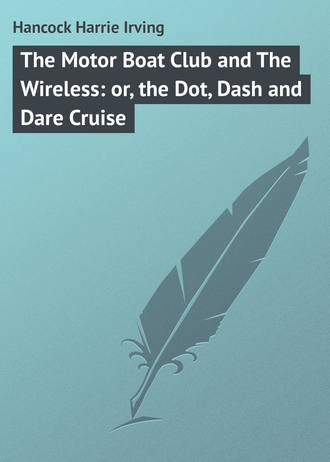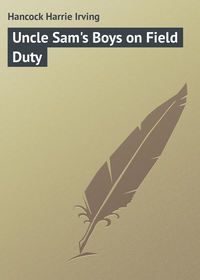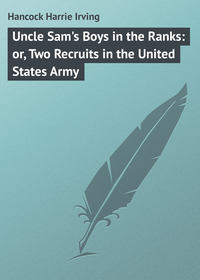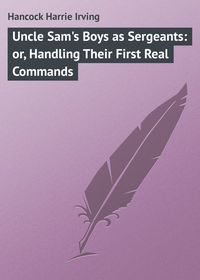 полная версия
полная версияThe Motor Boat Club and The Wireless: or, the Dot, Dash and Dare Cruise
“Is it?” groaned Dalton. Then, catching the trace of a smirk in Hank’s eyes, the rascal shook his fist at the steward of the “Restless,” snarling:
“I’ll find my own way to settle with you!”
“Take your time – when you’re feeling better,” Hank begged, cheerfully.
Fair-haired, soft-voiced young Dawley had followed the crowd out into the corridor. The hotel clerk, the proprietor and three or four of the servants all had increased the crowd there. Dawley rapidly learned what had happened.
“It’s a beastly outrage,” he announced, his soft voice sounding almost harsh in the indignation that he felt.
“Oh, take a fan, Dolly, and go out on the porch to cool off,” growled Joe Dawson.
One of the servants, in the excess of excitement, actually took the fair-haired youth by the shoulders, and, though the latter protested, thrust him out through the open door onto the porch, slamming the door after him.
“That’s too bad,” grinned Hank. “I’ll go out and see if the poor fellow has fainted.”
As Butts stepped out on the porch, closing the door shut after him, Dawley, his cheeks very red, leaped out from the chair into which he had sunk.
“It was you who played that mean trick on my friend,” cried Dawley, in a voice which he fondly believed trembled with rage.
“Yes,” admitted Hank, meekly.
“I’ll punish you for that!” quivered the soft-voiced one, stepping forward.
“Don’t strike me on the wrist,” pleaded Hank. “I have rheumatism there.”
But Dawley, too angry, or else too dull to understand that he was being made a mark for ridicule, continued to advance upon Butts, who retreated, a look of mock alarm in his face.
“Keep away from me – please do, while you’re angry,” begged Hank, still retreating.
“I won’t!” snapped Dawley. As Hank now retreated rapidly backward, Dawley went after him with corresponding speed.
“If you must have it, then, why – take it!” cried Hank, in a tone of desperation.
One of his hands had been held under his rain-coat all along. Now Hank thrust the other hand inside, as well, to reach for some object concealed there.
“Oh. O-o-oh! Don’t you drop that weight on my foot!” yelled Dawley, blanching and falling up against the wooden wall.
But Hank, ruthlessly, as one whose blood is up, brought both his hands swiftly into view as he sprang at Dawley. There was a yell from the fair-haired one as Hank bent forward, then dropped squarely on the toes of Dawley’s right foot – his pocket-handkerchief!
“There, now!” mimicked Hank Butts, turning on his heel.
A roar of laughter came from Mr. Seaton, Tom, Joe and two or three of the bystanders who had followed outside.
CHAPTER XXIV
CONCLUSION
“I’m sorry, young man,” said Powell Seaton, resting a hand on Dawley’s collar, “but the chief of police wants to see you.”
“I’m not arrested, am I?” demanded the soft-voiced one, in a tone of great alarm.
“I think not. But come along. The chief wants to see you in the office.”
There they found Hunter and his manacled prisoner, who had been carried into the office just as he sat on the chair.
“Where’s that red bag that started all the trouble?” demanded Chief Hunter. Joe Dawson produced it.
“You can’t open that,” leered Dalton, though he spoke uneasily.
“If we can’t unlock it, we’ll cut it open with a sharp breadknife,” mocked Hunter. “Yet I reckon thet we’ll find the key in yer pocket.”
This guess turned out to be correct. The key was inserted in the lock and the bag opened. Powell Seaton pushed forward to help the police official in the inspection of the contents.
“There are my papers,” cried Powell Seaton, grabbing at two envelopes.
“Look ’em over, ef you want, but I reckon I’ll haveter have ’em to go with the prisoner,” assented Chief Hunter.
“They’re the same papers that this fellow stole – one set from Clodis, and the other from my bungalow through a helper,” cried Mr. Seaton.
Anson Dalton watched Seaton with a strange, sinister look.
“Gracious! Look at these, here!” gasped Chief Hunter, opening a small leather case. Nearly a score of flashing white stones greeted his eyes.
“Di’munds, I reckon,” guessed the police chief.
“Yes; Brazilian diamonds,” confirmed Powell Seaton. “Probably this prisoner’s share or proceeds from smuggling in diamonds. That business, then, was what the ‘Black Betty’ was used for.”
“Those are the diamonds I came down here to negotiate for,” broke in Dawley, wonderingly.
“You?” demanded Hunter, surveying the soft-voiced one.
“Yes; my father is Dawley, the big jeweler at Jacksonville,” explained the youth. “Here’s his card. I’m the buyer for the house, and your prisoner wrote that he had some fine stones to sell.”
“They’re fine, all right, or I’m no judge of Brazilian diamonds,” nodded Powell Seaton. “But I guess the United States Government owns them, now, as a confiscated prize.”
A carriage was brought around to the door, and Anson Dalton was driven to the county jail, eight miles away, to be locked up there pending the arrival of United States officers.
Dawley easily proved his innocence, and the truth of his own story. Despite his effeminate manners and soft voice, it afterwards developed that the youth was a skilled buyer of precious stones, and a young man of no little importance in the business community of his home town.
Following the swift succession of events at the little Florida town, there came a lull in the long strain of excitement and danger.
Every now and then Dick Davis and Ab Perkins, aboard the Rio-bound “Glide,” found a chance to have a wireless message relayed back to the United States.
These messages came in veiled language, according to instructions, but they conveyed to Powell Seaton the joyous news that these two far-away members of the Motor Boat Club were proceeding safely on their long journey, and that no harm was happening to them, nor to the precious papers in their care.
One fine day a cablegram came all the way from Rio Janeiro which told that Dick and Ab had reached that Brazilian city, and had turned over the papers in their care to the waiting American for whom they were intended.
A week after that came another cablegram, announcing that the American syndicate had succeeding in locating the lost diamond field, and that papers for a proper patent were being filed with the Brazilian Government.
Right on top of that came the news, in the daily press, that Governor Terrero, of Vahia, had been shot and killed by an escaped prisoner – a former enemy whom the governor had greatly and wickedly harassed.
Captain Dave Lemly was captured about this time. He and Dalton, it developed, had been the principal American agents in a big scheme for smuggling Brazilian diamonds into the United States. The gems, it was shown, were secretly shipped in quantities from Rio, aboard a sailing ship. This ship, carrying a general cargo, was always met near Beaufort by Lemly, in the “Black Betty,” and the diamonds were taken on the little black schooner. As the “Black Betty” sailed as a fishing boat, Dave Lemly had always been able to evade the American customs authorities, and a hugely profitable business in diamond smuggling had been built up.
Governor Terrero, of the state of Vahia, Brazil, it is supposed, was behind the southern end of the smuggling scheme, though this has not been proved. Dalton, acting as the governor’s go-between and spy, had played his part well and desperately. Yet now, in the end, Dalton was convicted on the evidence furnished by some of the members of the late crew of the “Black Betty.” So was Lemly, and both are now serving long sentences in prison, along with the members of the crew of the smuggling schooner.
Clodis recovered, after a few weeks. He was handsomely rewarded by the new diamond syndicate for the dangers through which he had run. He last remembered descending the stairs to the “Constant’s” stairs, and had no recollection of having been struck down.
All the members of the guard over at Lonely Island were more than handsomely paid. Even Jasper was forgiven, and well rewarded.
After he had been in prison some length of time Anson Dalton one day confessed to Mr. Seaton’s attorney that, while at sea on the drab boat (which was afterwards found and confiscated by the revenue people), he, Dalton, had copied the stolen papers, intending to send one set southward and retain the originals.
After losing both the “Restless” and the “Glide” in the fog, Dalton had had Lemly put in to shore. There they had been met by a trusted Brazilian spy for Governor Terrero. The Brazilian, with the copies of the papers, had hurried to New York by train. This Brazilian did not succeed in starting for Rio until some days after the “Glide” had sailed, and, moreover, he went on a slower boat. So, by the time the Brazilian spy arrived at Rio, the American syndicate had located the lost diamond field, had filed patents with the Government, and Terrero had died. So all of Anson Dalton’s plotting had come to naught.
One of Powell Seaton’s first acts was to adjust fully the claim of the Havana line for the towing of the “Restless” through that fearful northeast gale.
While waiting for the final news of the success of his plans, the charter-man cruised much up and down the coast with the boys of the “Restless.” Then afterwards, through the month of November, Seaton enjoyed another cruise with them.
The charter money was not all that Captain Tom, Engineer Joe and Steward Hank received for their splendid work.
As soon as the final plans of the great new American diamond syndicate at Rio Janeiro had been established on a safe and firm basis, the charter-man of the “Restless” was prepared to talk of a splendid reward. His plans were so big, in fact, that all three of the boys felt bound to call a halt. Yet the reward that they did finally accept made very important additions to the bank accounts of all three of these daring young motor boat navigators.
Dick Davis and Ab Perkins, on their return from Rio, were “remembered” by Mr. Seaton with bank drafts the size of which almost took away their breath.
Then came a new cruise, a new set of adventures in new surroundings. It was a cruise which the many friends of our Motor Boat Club boys will agree was the most wonderful, the most exciting, and certainly the most mysterious lot of adventures through which any member of the Club ever passed. The details of what happened, however, must be reserved for the next volume in this series, which will be published under the title: “The Motor Boat Club in Florida; Or, Laying the Ghost of Alligator Swamp.”
[THE END]








